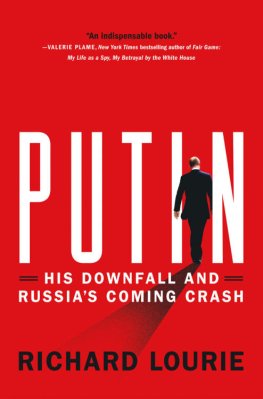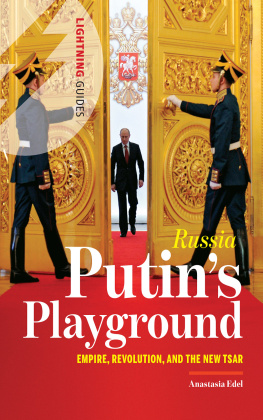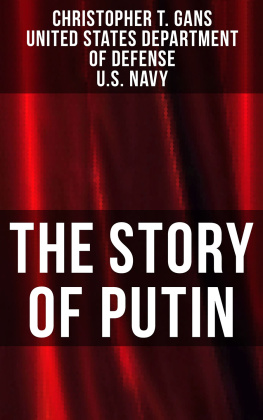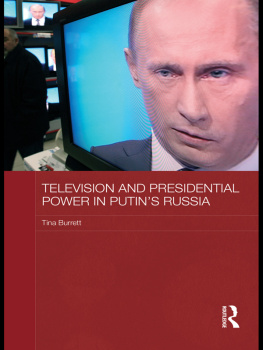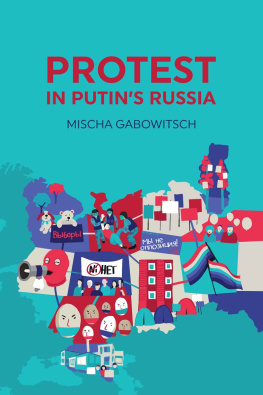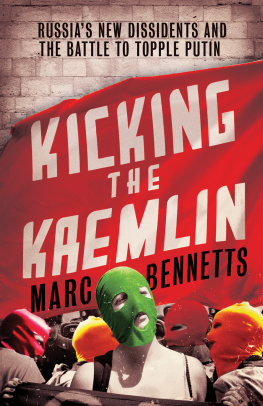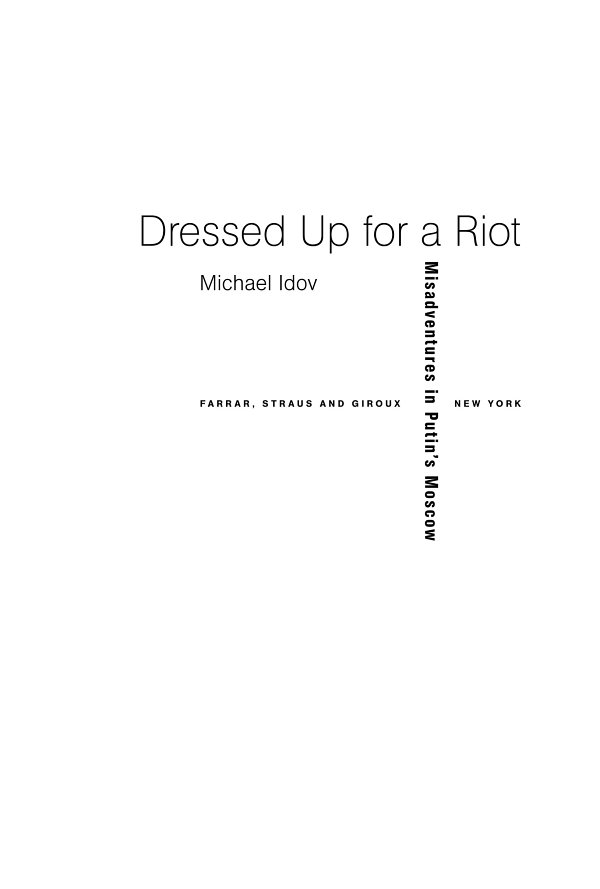
The author and publisher have provided this e-book to you for your personal use only. You may not make this e-book publicly available in any way. Copyright infringement is against the law. If you believe the copy of this e-book you are reading infringes on the authors copyright, please notify the publisher at: us.macmillanusa.com/piracy.
For Garros
In the end, of course, well botch it like always. But well botch it beautifully.
Alexei Lapshin, campaign manager for an unnamed opposition candidate, in Roman Volobuevs Tomorrow
2012. Russia. The years main event, also known as the furry furor, the pussy riot, and the bush league revolution, was the glamorous unrest in which society ladies stopped grooming their mons pubis as a protest against barbarism and tyranny, and their oligarch lovers were forced to rise up against the despot. The unrest died down when the full bush went out of fashion again.
Viktor Pelevin, Batman Apollo
Authority smiling sexily Waxed skin hiding weaponry Use one gadget and youre an accessory
Oxxxymiron, Bigger Than Ben
M y parents, Mark and Yelena Zilberman, who live in the suburbs of Detroit, keep a little portrait of Lenin inside their fridge. Its made of tiny beads sewn onto a napkin-size cloth and resides in an old Ziploc, in the covered dairy bin next to the eggs. Through these two layers of murky plastic, the leader of the proletariat is meant to observe the plenty that the Zilbermans are enjoying here in the United States, and presumably bawl his beady eyes out.
This, in short, is the crux of my familys identity: less American than no longer Russian. Their escape from Russias orbit in 1992 was the bravest and most radical act of their lives, and it defines them still. Like every other immigrant child, I grew up quite aware that this sacrificeof home, language, career, contextwas performed in large part for my benefit. I owed them America.
So here I was twenty years later, in my Manhattan home on New Years Eve, about to dial them up as 2011 flipped over to 2012 to tell them that I was moving to Moscow.
I ran through my reasons again. For one thing, I wanted my infant daughter, Vera (When should I mention that Id be taking my kid there, too?), to have native fluency in Russiansomething my wife, Lily, and I, who speak a sort of macaronic Nabokovian jumble when no one else is within earshot, might not have enough discipline to provide. For another, the job was a huge promotionfrom a staff writer directly to editor in chief of a major magazine. And I would still be working for a U.S. company: specifically, Cond Nast, one of whose flagship Russian properties GQ I had, in a bewildering turn of events, been invited to run.
There was another factor, too. I wasnt sure if I should include it in the list. Russia, I felt, was on the verge of something fascinating. Just a month earlier, Moscow had seen its first middle-class protests against the Putin regime, protests gaining in volume and size with each passing weekseven thousand people in the streets, sixty thousand, one hundred thousand. A wave of global unrest was toppling regimes around the world; Moscows Bolotnaya Square could be the new Tahrir. Whats more, the people organizing and leading these protests were media folk like meeditors, columnists, bloggersquite a few of whom I counted as personal friends. Some had stayed in my apartment, played with Vera, professed inevitable awe of New York. Well, it was my turn to be awed. I was writing dry municipal-interest stories for New York magazine; they were rewriting history. A part of me already wondered what job I could wangle if they got to run the countryor what book I could write if they didnt. Moscow was the place to be. And it just handed me a reason to be there.
Sure, the previous American to move to Moscow to edit a magazine, Forbes s Paul Klebnikov, was shot dead there in 2004. (Best if that didnt come up in the conversation.) But, in post-Soviet Russias wildly sped-up timeline, 2004 was already the distant past. That, in fact, was the most exhilarating thing about Moscow: it seemed to always barrel ahead, making up for lost time by repackaging itself half-blindly after whatever coolness it espied in other cities. It wanted to be London, Paris, and Rome at the same timebut, above anything, it wanted to be New York. Boy, did Moscow in 2011 ever want to be New Yorkand for a New Yorker like me, this made it into a veritable playground of wish fulfillment. The starving-hysterical-naked 1990s, when a pimply students flash of the U.S. passport at a clubs feis kontrol instantly gathered a harem, were gone, and certainly for the best; but American work experience still bestowed upon the bearer a kind of magic authority. To anyone whose ambition outpaced their patience, Russia was thus a space-time shortcut, a wormhole to success. Wildcat start-ups found funding, third-rate musicians became adored household names, things got done badly, more often than not, but done. In return, as wormholes are theorized to do, it changed you on the atomic level. The you emerging on the other side might just be a little different.
* * *
I had never lived in Russia proper. My family came to the United States from Riga, Latvia, a Baltic republic affixed to the westernmost edge of the U.S.S.R. in 1940 as part of the Hitler-Stalin pact. Thanks to its tiny sizeand perhaps to a similarly sounding Latveria in the Marvel Comics universeLatvia is a kind of go-to place for sitcom jokes when one needs to quickly connote Eastern European obscurity; in reality, Riga is rather more Germanic than Slavica city of prim boulevards and frothy Jugendstil architecture, presided over by a trio of rooster-topped Gothic spires. Throughout the rest of the Soviet era, it managed to preserve a self-image as an occupied entity (provincial tourists were sometimes unsure if their rubles would be good here). My grandparents settled in Riga as schoolteachers after the war, which would technically make them part of the occupation. By the time my mother was born, however, Latvian Russians had already developed a kind of in-between identity. When the U.S.S.R. broke apart, remarkably few of them would take Russia up on its limited-time offer of citizenship.
Then there was the matter of our Jewishness, which the Soviets treated as a strictly ethnic affiliation. Being Jewish meant zip in the way of religion; it meant a funny last name (Zilbermancheck), a funnier nose and/or hair (check and check), and the stigma of rootless cosmopolitanism, a sticky Stalin-era formulation
My childhood thus may not have been a typical Russian one, but it was certainly Soviet enough. Most of it took place in the same dreary communal apartment at 6 Karl Marx Street where my mother had lived since she was a kid, watching the neighbors boy go from a listless fifth grader to a frequently jailed alcoholic whose preferred mode of operation after a day of drinking was to launch tentative ax attacks on his own father. His prone bulk, still and huge like a felled tree, sprawled along the hallway next to shelved skis and shrouded bikes, forms one of my earliest visual memories. Another neighbor, an elderly madman, had long ago convinced himself that the other denizens of the apartment were out to poison him. So he would hover in the communal kitchen waiting for other cooks to leave, then thrust his hands into their boiling soups, fish out piping-hot gobs of meat, devour them bent over the potthe logic being that the neighbors wouldnt poison their own foodand toss the bones back in. My mother and grandmother would find their cooking violated so many times that they started putting out decoy soups.
Heres where I wish I could write that I found escape, salvation, and a sense of belonging in the great works of Russian literature. But that would be a complete lie. In truth, the Soviet schools force-fed kids the classics far too early, and through the rusty funnel of collectivist ideology at that (Eugene Onegin as a superfluous man, etc.)so those books just felt like a distilled essence of boredom, at one with the chalky walls around and the strobing fluorescent lights overhead; the only place to which a Russian adult escapes by picking up Anna Karenina is the Soviet classroom. I didnt learn to love Tolstoy until much later, and I detest Dostoyevsky to this day. Instead, my first real connection to the Russian culture ran through its glorious, inept, heroic rock music.
Next page

